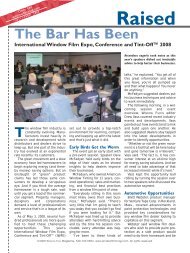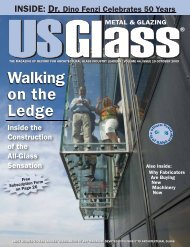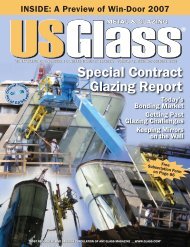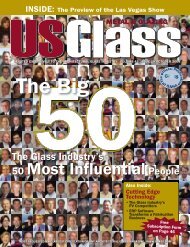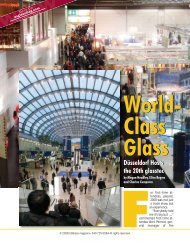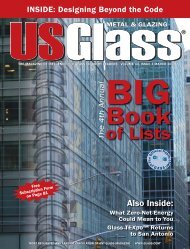US Glass - April 2008 - USGlass Magazine
US Glass - April 2008 - USGlass Magazine
US Glass - April 2008 - USGlass Magazine
Create successful ePaper yourself
Turn your PDF publications into a flip-book with our unique Google optimized e-Paper software.
Only On<br />
usglassmag.com<br />
APRIL <strong>2008</strong><br />
One Week, All <strong>Glass</strong><br />
BEC Crowds Come to Las Vegas<br />
continued<br />
“You know that if you scrape this with<br />
a metal scraper you’re going to see<br />
damage to the glass,” Burk said.<br />
“We’ve got people out there saying it’s<br />
the glass that’s at fault … and we all<br />
know better than that.”<br />
He suggested plastic films that protect<br />
glass during the construction<br />
process as one way to avoid problems.<br />
Jim Fairley of Colonial <strong>Glass</strong> Solutions<br />
presented “Systems and <strong>Glass</strong> … Which<br />
System Fits Your Business.”<br />
“I’m not here to tell you which system<br />
to use,” Fairley commented. “The systems<br />
that works is the system that<br />
works for your company.”<br />
However, he did offer some suggestions.<br />
For lean manufacturing—which<br />
he summarized as a focus on waste removal<br />
to increase throughput—he suggested<br />
each member of management<br />
write something they considered wasteful<br />
on a post-it note. After everyone had<br />
put three or more post-its on the wall,<br />
the overlap could be considered items<br />
to look at cutting right away.<br />
Fairley explained that following Six<br />
Sigma means focusing on reducing variation<br />
and reworks to increase throughput.<br />
He pointed out one area where there’s<br />
typically lots of variation and reworking.<br />
“Think about how much time is wasted on<br />
the bidding process,” he said. He recommended<br />
marking off how much time is<br />
spent with each bid to take note of the<br />
time lost and how that could be changed.<br />
The theory of constraints, Fairley explained,<br />
can be summed up as “one<br />
hour lost at a bottleneck is an hour lost<br />
for the whole process.” Finding the bottleneck<br />
is the starting point, whether it’s<br />
a machine in the facility or an idle group<br />
on the jobsite. Then it’s necessary to explore<br />
the constraints of the bottleneck<br />
to find a solution. Fairley also recommended<br />
that, if there are problem on<br />
the jobsite, it’s necessary to fix the problem<br />
first, and then continue to move<br />
product through, otherwise you’ll just be<br />
creating additional problems.<br />
Richard Kalson and David White of<br />
Thorp Reed & Armstrong LLP focused on<br />
different industry problems. The two<br />
talked about a “new hot clause” showing<br />
up in subcontracts during their presentation<br />
on “Construction Law Developments<br />
in 2007.” The pay-when-paid clause has a<br />
big difference from the pay-if-paid clause,<br />
the pair noted during their talk.<br />
White explained that a pay-if-paid<br />
clause more or less says that a subcontractor<br />
will only be paid if a general contractor<br />
is paid by the owner, implying that<br />
if the general contractor is not paid the<br />
subcontractor suffers that fate as well.<br />
“Don’t agree to this,” White insisted.<br />
“It’s important because once that<br />
risk of payment shifts from the general<br />
contractor being paid by the owner to<br />
you, the subcontractor, then you are<br />
completely at the mercy of the payment<br />
by owner and you don’t ever want to get<br />
into that situation,” he said. “That<br />
should always be a deal breaker.”<br />
As White noted, “Some states have<br />
actually enacted legislation that these<br />
clauses are unenforceable.”<br />
While the “pay-if-paid clause can result<br />
in your never ever ever being paid by the<br />
general,” White explained, the pay-whenpaid<br />
clause “sets a reasonable amount<br />
of time, say a year,” after which point the<br />
court will usually make a decision that<br />
the subcontractor must be paid.<br />
In response to a question from the<br />
audience, White agreed that there can<br />
be an advantage to striking a pay-whenpaid<br />
contract clause so that it simply<br />
says the general contractor shall pay<br />
the subcontractor.<br />
“To the extent that you can get rid of<br />
that, try that, absolutely,” White agreed.<br />
Following the almost overwhelming<br />
technical knowledge presented, a highlight<br />
for many attendees was the<br />
keynote speech from Mike Eruzione,<br />
who was the team captain of the 1980<br />
Olympic Gold Medal hockey team. Unlike<br />
other sports heroes on the<br />
speaking circuit, Eruzione did not<br />
dwell on his own accomplishments<br />
(like making the winning<br />
goal in the U.S. vs. Russia game)<br />
but rather talked of team efforts<br />
and advancements.<br />
When asked to name his proudest<br />
achievement he chose two:<br />
when the movie “Miracle” premiered<br />
and getting to light the torch at<br />
the Salt Lake City games. “I was proud<br />
of the movie, because it means that<br />
people who were there can relive it and<br />
people who weren’t alive, or who aren’t<br />
yet alive will get to see it. It was very exciting<br />
for me.<br />
“The only thing that tops it is lighting<br />
the torch to open the Olympics,” he<br />
added. “They didn’t tell us until very late<br />
the night before that we were going to<br />
do it. It was a very big secret. We had to<br />
rehearse at midnight to keep it a secret.<br />
I came back to the condo I was staying<br />
in at 3 a.m. and told my wife, to which<br />
she replied ‘Yeah, right, what bar were<br />
you guys drinking at?’“<br />
It was just that kind of humor and<br />
self-deprecation that endeared the star,<br />
who never played professional hockey,<br />
to the crowd.<br />
“I liked him because he was a regular<br />
guy,” said one attendee, “you could really<br />
relate to him.”<br />
Despite the success of the packed<br />
seminars, many attendees were most<br />
interested in “relating to” their colleagues<br />
at the conference. Either way,<br />
there was something for everyone at<br />
the conference.<br />
“BEC continues to be the ultimate<br />
networking and educational event for<br />
the contract glazier. We had great feedback<br />
from the attendees and I am confident<br />
that we will continue to work to<br />
make that event the best one around,”<br />
commented Perilstein. “All in all, our industry<br />
benefits from the technical and<br />
education process of <strong>Glass</strong> Week and<br />
BEC and I believe everyone who attended<br />
was able to get something tangible<br />
out of it.”<br />
Dates for next year’s BEC Conference<br />
will be announced later this year. ■<br />
Megan<br />
Headley and<br />
Debra Levy are<br />
the editor and<br />
publisher of <strong>US</strong><strong>Glass</strong>,<br />
respectively.<br />
© <strong>2008</strong> <strong>US</strong><strong>Glass</strong> magazine. 540-720-5584 All rights reserved.



